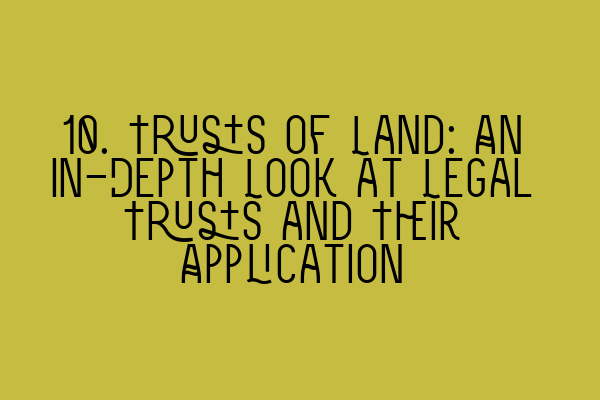10. Trusts of Land: An In-Depth Look at Legal Trusts and Their Application
Welcome to the SQE Property Law & Land Law blog! In this post, we will delve into the world of trusts of land, exploring their legal intricacies and how they are applied in various situations. Whether you are a solicitor, law student, or simply interested in property law, this in-depth analysis will provide you with valuable insight. So, let’s jump right in!
Before we proceed, if you’re preparing for the SQE 1 exams, make sure to check out our related article on SQE 1 Practice Exam Questions [link to https://fqps.co.uk/sqe/sqe1-preparation/mcq-practice-quiz] to enhance your preparation. Additionally, if you’re looking for comprehensive SQE 2 preparation courses, head over to our SQE 2 Preparation Courses article [link to https://fqps.co.uk/sqe/sqe2-preparation] for valuable resources and guidance.
1. Understanding Trusts of Land
A trust of land is a legal arrangement where a property is held by one or more individuals (known as trustees) on behalf of another person or group of people (known as beneficiaries). This concept allows for the separation of legal and beneficial ownership, offering a range of advantages for property owners.
2. The Purpose and Benefits of Trusts of Land
Trusts of land are utilized for various reasons, including estate planning, protecting assets, and facilitating property transfers. By placing property in a trust, individuals can ensure that their assets are managed and distributed according to their wishes, while also minimizing tax implications.
3. Types of Trusts of Land
There are several types of trusts of land, each serving specific purposes. Some common examples include bare trusts, where the beneficiaries have an immediate and absolute right to the trust property, and discretionary trusts, where the trustees have the power to distribute the property among the beneficiaries as they see fit.
4. Legal Requirements for Creating a Trust of Land
To establish a valid trust of land, certain legal requirements must be met. These include certainty of intention, certainty of subject matter, and certainty of objects. Understanding these essential elements is crucial for anyone involved in the creation or administration of trusts.
5. Powers and Duties of Trustees
Trustees have specific powers and duties bestowed upon them, aiming to ensure they act in the best interests of the beneficiaries. These responsibilities include managing the trust property, exercising due diligence, and accounting for any actions taken during their trusteeship.
6. Trusts of Land and Co-Ownership
Trusts of land are commonly used in co-ownership situations, where multiple individuals own a property together. This arrangement can help clarify the ownership shares, rights, and obligations of each co-owner, preventing potential conflicts in the future.
7. Trustees’ Powers of Delegation
Trustees have the authority to delegate some or all of their powers and duties to other individuals or professionals. This power of delegation can be particularly useful when specialized expertise is required, ensuring the smooth management and administration of the trust.
8. Termination and Variation of Trusts
Trusts of land may be terminated or varied under certain circumstances. This can occur when the trust’s purpose has been fulfilled, the beneficiaries unanimously agree to terminate or vary the trust, or through a court order. Understanding the procedures and implications of terminating or varying a trust is vital for solicitors and individuals involved.
9. Litigation and Disputes Involving Trusts of Land
Like any legal arrangement, trusts of land can be subject to disputes and litigation. These disputes may arise due to disagreements between beneficiaries, allegations of breach of trust by trustees, or challenges regarding the validity of the trust itself. In such cases, seeking professional advice and understanding the relevant legal principles is crucial for resolving the issues effectively.
10. Seeking Professional Advice
Given the complexity and potential legal implications surrounding trusts of land, seeking expert advice from solicitors specializing in property law is highly recommended. They can provide valuable guidance on trust creation, administration, and dispute resolution, ensuring clients’ interests are safeguarded.
We hope this in-depth look at trusts of land has provided you with a comprehensive understanding of these legal instruments and their application. If you’re looking for more resources to prepare for the SQE exams or gain expertise in property law, check out our SQE 1 Preparation Courses article [link to https://fqps.co.uk/sqe/sqe1-preparation] for valuable insights and guidance. Additionally, stay updated on the SRA SQE exam dates [link to https://fqps.co.uk/sqe/sqe1-sqe2-exam-dates] to plan your studying and preparation effectively.
Remember, property law is a vast and ever-evolving field, and staying up to date with the latest developments is essential for any legal professional.
